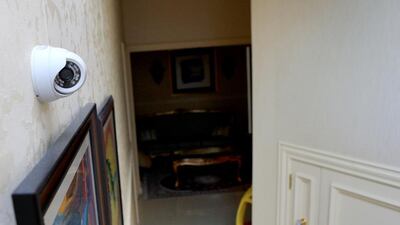Few would unhesitatingly welcome the trend towards installing CCTV cameras in homes to monitor domestic workers. Some might wonder if it is an intrusion too far. Others might acknowledge this point but still argue that CCTV makes some sense for working parents who are forced to leave their children in the care of paid helpers. It’s undeniable that nothing can aid peace of mind so much as a parent knowing that their children are safe and well-cared for.
But it's not always possible to be sure of this, particularly in countries like ours where domestic staff are recruited from many parts of the world. So, an anxious mother may not get to meet the nanny she has hired until she arrives on her doorstep. She will be unable to gauge beforehand, in a face-to-face interview, if the nanny seems a caring and trustworthy person. Impeccable references do not always mean that someone is suitable – and suitably patient – to look after children. Sometimes, as The National reported yesterday, this comes to light in chilling ways. For instance, the maid in Ras Al Khaimah who was caught on CCTV beating a four-year-old boy in her care.
Such horror stories are just part of the reason that so many parents are worried about what happens to their children when they are away from home. Unsurprisingly, the advent of reasonably priced CCTV units that can be monitored from a smartphone has led hundreds of people to install surveillance systems.
It is undeniable that high levels of surveillance in public areas provide a sense of security – and crucially, footage for the police and courts should something go wrong. Few would quibble about surrendering some privacy for greater safety. But in private homes, the balance between privacy and safety is obviously different and sometimes domestic workers are understandably uncomfortable about being filmed as they go about their day’s work. Perhaps the monitoring could be restricted to the probationary period?
Ultimately, of course, the issue is all about trust. CCTV cannot substitute for parents trusting the person who cares for their children. Much of this comes from satisfaction with one’s work and place in the home. It is important to treat domestic staff as fellow human beings. Happy workers will make for a trusting and caring equation of mutual benefit.

